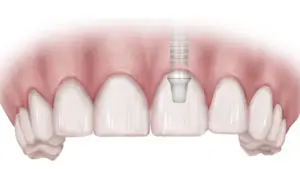Frequently Asked Questions
What is a dental implant?
 A dental implant is a substitute tooth root that serves the same function as a natural tooth root. It preserves bone and provides a stable foundation for a replacement tooth. Once the implant(s) are placed and restored, they look, feel, and function like natural teeth. Most dental implants are made of titanium, which is a biocompatible material used in orthopedic implants.
A dental implant is a substitute tooth root that serves the same function as a natural tooth root. It preserves bone and provides a stable foundation for a replacement tooth. Once the implant(s) are placed and restored, they look, feel, and function like natural teeth. Most dental implants are made of titanium, which is a biocompatible material used in orthopedic implants.
How do dental implants compare to bridges, partials and dentures?
Dental implant treatment has a better long-term prognosis than other methods of tooth replacement, such as bridges, partials and dentures. These alternative methods of treatment usually need to be replaced several times over a shorter time span. Partial and conventional dentures are also associated with low patient satisfaction and may function poorly. Since dental implants prevent the bone resorption (deterioration) that occurs when teeth are lost or removed, the natural appearance of the smile is preserved.
 When preparing sites for a conventional bridge, the adjacent teeth are drastically reduced in order to accommodate full crown coverage. Cutting down teeth in this manner may jeopardize their vitality and cause them to be damaged, or even lost. Frequent use of removable partial dentures may exert pressure or torque the teeth to which the partial ‘hooks’ on to. Over time, this may result in loosening of those teeth.
When preparing sites for a conventional bridge, the adjacent teeth are drastically reduced in order to accommodate full crown coverage. Cutting down teeth in this manner may jeopardize their vitality and cause them to be damaged, or even lost. Frequent use of removable partial dentures may exert pressure or torque the teeth to which the partial ‘hooks’ on to. Over time, this may result in loosening of those teeth.
From an aesthetic standpoint, the partial ‘clasps’ or ‘hooks’ are often visible when the patient smiles. Also, dentures and partials are known to accelerate the bone resorption process, which causes the appearance of premature aging.
Will my new teeth look natural?
Your new replacement teeth will look, feel and function like natural teeth. And since dental implant treatment is the only tooth replacement option that prevents bone resorption, which can cause your smile to look unnatural, the long-term aesthetics are usually much better than with any other treatment option.
Procedures & Home Care
Who is a candidate for dental implant treatment?
Nearly everyone who is missing one or more teeth and in general good health is a candidate for dental implant treatment. There are a few medical conditions that can undermine the success of implant treatment, however, there are very few conditions that would keep someone from having implant treatment altogether.
Quality and quantity of available bone for implant placement is a factor in qualifying for dental implants than medical conditions. This being said, even people who have lost a significant amount of bone can still be candidates for dental implant treatment with additional procedures to add bone or create new bone.
How long does it take to complete treatment?
The length of treatment depends on your individual treatment plan. For the majority of patients, treatment can take several months. If bone grafting procedures are needed, the total treatment time is usually six to nine months.
Patients who qualify for immediate function procedures receive their replacement teeth the same day the implants are placed. For such patients, significant treatment planning and coordination with the restorative dentist will take place prior to implant placement.
Is the surgical procedure painful?
Most patients report that the discomfort is far less than they expected, and is even less than having a tooth extracted. And although everyone is different with regard to pain tolerance, many patients are very comfortable simply taking over-the-counter pain remedies afterward.
What is involved in taking care of dental implants?
The home care recommended varies depending upon the type of implant supported replacement teeth. For example, a single implant supported crown is cleaned like a natural tooth, with regular brushing and flossing. Implant supported bridges that replace a few teeth are cleaned like tooth supported bridges, by brushing and flossing with a floss threader.
Home care is a little more complicated for people who are missing all of their teeth, in that special brushes and floss are often recommended. With overdentures, it is necessary to clean the implant attachments, as well as the overdenture. Permanently fixed implant supported replacement teeth are cleaned like all other bridges.
In all cases, it is recommended that patients see their dentist and hygienist at least twice each year. These visits, combined with proper home care, are essential to the long-term success of implant treatment. After the first year of treatment, you will need to return to your Surgeon if deemed necessary by your dentist.
Success Rates
How long do implants last?
Documented clinical research demonstrates that dental implant treatment has a long-term success rate of over 95%, which is much better than the success rates for tooth-supported bridges, partial and full dentures.
Many factors contribute to the long-term success of implant treatment, such as home care and regular maintenance visits to the dentist.
Research demonstrates that the typical tooth supported bridge lasts from 7-10 years and that partials and dentures are functional for approximately years. Dental implants, when properly maintained with good home care and professional hygiene appointments, will likely last 20-30+ years.
Do dental implants ever fail?
Dental implant treatment is one of the most successful procedures in the medical-dental field, with documented success rates over 95%. Although successful treatment is very predictable, there are rare occasions where the bone does not completely bond to the implants. When this occurs, new implants are placed, and the success rates for the replacement implants are even higher.
Cost & Insurance
What is the cost of implant treatment?
An investment in dental implant treatment is an investment in overall health, appearance and well being, since it involves preserving the integrity of facial structures, as well as replacing missing teeth.
The actual cost of implant treatment is based on a number of factors, such as the number of missing teeth being replaced, the type of implant supported teeth (treatment option) recommended and whether additional procedures are necessary to achieve the proper esthetic and functional result.
The fee is usually comparable to other methods of tooth replacement; however, long-term, implant treatment is generally more cost effective than other options, such as bridges, partials and dentures, which need to be replaced every 5-10 years.
Is dental implant treatment covered by dental insurance?
Insurance coverage for dental implant treatment varies and is subject to plan provisions as well as eligibility at the time of service. One of our Implant Treatment Coordinators will verify your insurance for any possible coverage and help you optimize your benefits.
We would be happy to assist you in determining if your policy has coverage for dental implants.

